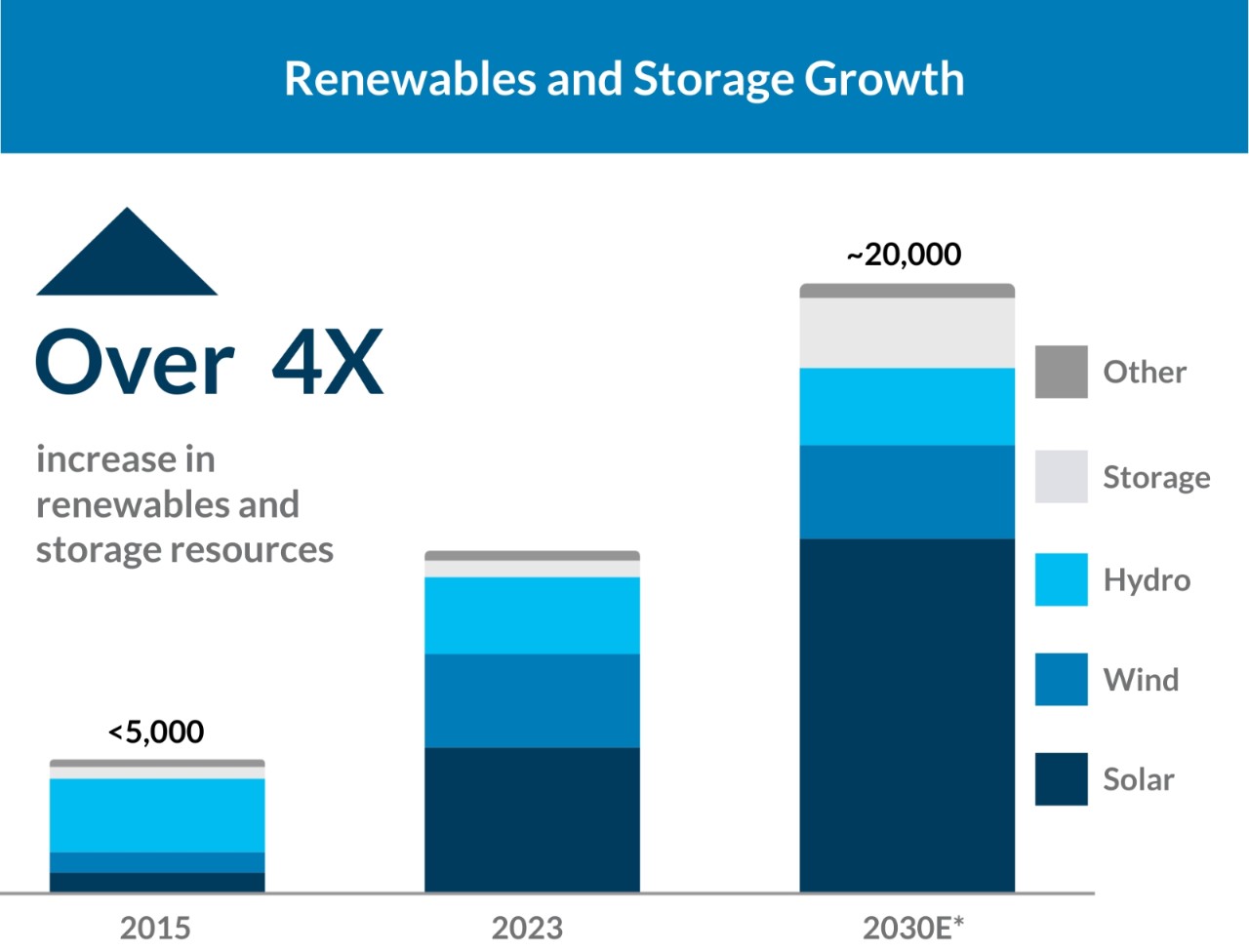Clean Energy Aligns with Southern Company’s Mission
Providing clean, safe, reliable and affordable energy to customers is fundamental to Southern Company’s mission. We are transforming our business as we build a diverse energy portfolio, develop innovative programs and services for our customers and research new clean energy technologies.
Our strategy to reach net zero by 2050 includes the following:
- Continued assessment of coal-fired generating assets
- Thoughtful use of natural gas
- Further growth in our portfolio of clean energy resources
- Enhanced demand response, energy efficiency initiatives, and distributed energy resources
- Negative-carbon solutions
- Continued investment in research and development of emerging clean energy technologies

Greenhouse Gas Emissions Reduction Across the System
We have established greenhouse gas (GHG) emission reduction goals to achieve a 50% reduction from 2007 levels by 2030 and reach net zero by 2050, consistent with the commitments of the Paris Agreement. These goals are based on the equity share approach for our owned facilities across the system (Scope 1), which includes our electric and natural gas distribution operations. In addition to our efforts to reduce direct emissions (Scope 1 and 2), across the Southern Company system we are working with upstream fuel suppliers and downstream customers to reduce indirect (Scope 3) emissions.
Southern Company GHG Emissions
Through 2023, Southern Company has reduced Scope 1 GHG emissions by 49% relative to our baseline year of 2007. Approximately 69% of our emissions profile is comprised of Scope 1 emissions, followed by our Scope 3 emissions at approximately 31%.
In 2023, approximately one-third of our annual energy mix for the electric operations was from clean energy resources.
We expect to have over 20,000 megawatts (MW) of renewable and storage resources in our portfolio by 2030.
By the late-2030s, we expect about an 85% reduction in nameplate coal capacity from 2007.
Infrastructure Investment and Decarbonization - Natural Gas Distribution
Natural gas distribution and the existing infrastructure are foundational to reaching a net-zero clean energy future with the greatest consumer affordability. In close partnership with our customers, regulators and other stakeholders, we are collaborating to reduce greenhouse gas emissions across the value chain. Our strategy to reduce Scope 1 emissions from our natural gas utilities includes pipeline modernization, leak detection and repair, damage prevention, reduction in blowdown emissions, and investing in Next Generation Natural Gas and renewable gas. Additionally, we operate over 400 fleet vehicles, which run on Compressed Natural Gas (CNG), reducing common urban pollutants by up to 90% and greenhouse gas emissions by up to 21% compared to vehicles operating on traditional fuels.

Focus on Scope 3 Indirect Emissions Reduction
In addition to industry-leading Scope 3 reporting, Southern Company and Southern Company Gas continue employing a deliberate and disciplined approach to reduce Scope 3 emissions by focusing on upstream and downstream solutions that yield value for customers and other stakeholders. Southern Company Gas is working with participants across that value chain to pursue continuous improvement in voluntary reporting standards.
Given the lack of standardization and accuracy of measurement methodologies and protocols for reporting Scope 3 emissions, as well as other factors, Southern Company has not established a target for Scope 3 emissions. We are actively supporting efforts to standardize methane emissions measurement, monitoring, reporting and verification, including related mitigation approaches, and taking tangible action to reduce our actual Scope 3 emissions. We recognize the importance many stakeholders place on Scope 3 emissions and are committed to ongoing transparency and dialogue.
- Annual energy mix represents all of the energy the Southern Company system uses to service its retail and wholesale customers. It is not meant to represent delivered energy mix to any particular retail customer or class of customers.
- Renewables/Other category includes wind, solar, hydropower, biomass, and landfill gas.
- Annual energy mix percentages include non-affiliate power purchase agreements.
- With respect to renewable generation and associated renewable energy credits (RECs) to the extent an affiliate of Southern Company has the right to the RECs associated with renewable energy it generates or purchases, it retains the right to sell the energy and RECs, either bundled or separately, to retail customers and third parties.
Includes owned and contracted resources including 100% capacity for jointly owned projects. With respect to renewable generation and associated renewable energy credits (RECs), to the extent an affiliate of Southern Company has the right to the RECs associated with renewable energy it generates or purchases, it retains the right to sell the energy and RECs, either bundled or separately, to retail customers or third parties.
Other includes biomass and landfill gas.
*Future estimates include owned and contracted capacity that have received regulatory approval. Additional renewable resources could be added prior to 2030 at Southern Power or at our operating companies, should they be proposed and approved through regulatory processes.
*The traditional electric operating companies are working with applicable regulators through their IRP processes to continue the generating fleet transition in a manner responsible to customers, communities, employees, and other stakeholders. Fleet transition is dependent on many factors, including load growth, energy policy and regulations, natural gas prices, and the pace and extent of development and deployment of low- to no-GHG energy technologies and negative carbon concepts.




